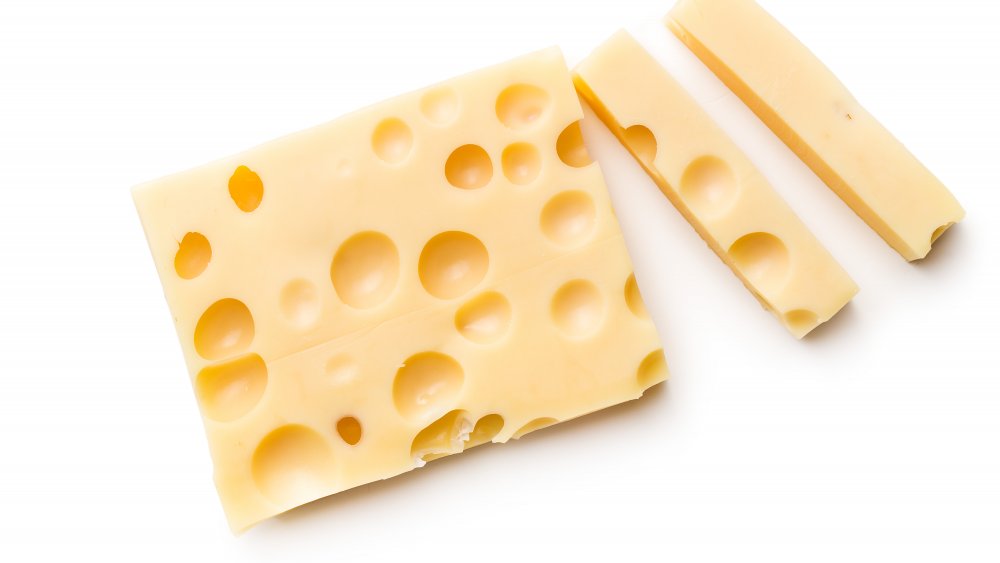When You Eat Cheese Every Day, This Is What Happens To Your Body
Cheese is arguably pretty delicious — no matter the form. For many people, cheese is an essential component to their diet. After all, think of all the amazing meals in which cheese takes center stage: mac and cheese, pizza, nachos. That list list could go on and on. Not to mention, cheese can be consumed in a myriad of ways, be it fried, melted, or just sliced. Hungry yet? Although it may seem like a miracle food, cheese is also somewhat controversial due to its impact on a person's health.
However, it's really not as simple as putting cheese in a "good" or "bad" column; it has both pros and cons in terms of health. The truth is, when you eat this dairy product every day, a lot can happen to your body. Like what? Here's the good, the bad, and the ugly that happens as a result of eating cheese each and every day.
When you eat cheese every day, your risk of getting heart disease goes up
One of the biggest issues people have with cheese is that it has quite a bit of saturated fat. Terry Fairclough, a nutritional therapist and founder of Your Body Programme, explained to Yahoo that this means it's hard for your body to consume. As such, the Centers for Disease Control and Prevention have actually placed guidelines on how many saturated fats Americans should consume in a day, specifically suggesting adults to "consume less than 10 percent of calories per day from saturated fats." But does that really mean the saturated fats in cheese are all that bad for you?
According to Healthline, "many experts argue that one macronutrient can't be blamed for disease progression and that diet as a whole is what matter." Yet and still, saturated fats have "been consistently linked to an increased risk of obesity, heart disease, and numerous other health conditions ." If you were to eat cheese every day, it's very likely you'd be consuming far too many saturated fats than recommended, thus putting yourself at risk for poor health and disease.
You could raise your cholesterol levels by eating cheese every day
Having high cholesterol is a serious health issue by itself, and unfortunately for cheese fanatics, the dairy product is "among the foods most likely to raise a person's cholesterol level," according to Medical News Today.
High cholesterol can lead to a host of issues. Although the condition itself won't cause you experience symptoms, "it can increase your risk for conditions that do have symptoms, including angina (chest pain caused by heart disease), high blood pressure, stroke, and other circulatory ailments," WebMD revealed. Of course, this isn't to say that cheese will cause this in everyone.
The cholesterol in cheese probably won't impact you unless you "are one of those people who are susceptible to the effects of cholesterol," at which point "eating cheese may increase your risk of heart disease and strokes," nutritional therapist Terry Fairclough told Yahoo. Since cholesterol is so tricky — and you might not know if you have high cholesterol — it's smart to monitor your daily cheese intake so you don't accidentally raise your cholesterol to an unsafe level.
Eating cheese every day increases your risk for headaches and other conditions
When you look at your diet, there are usually a few macronutrients — like protein, fat, and carbs — that make up the majority. However, there's another part of people's diets that tends to get overlooked but really shouldn't: sodium. Your sodium intake can really mess with your health if it's too high and, sadly, cheese tends to be high in sodium.
According to the American Heart Association, "Too much sodium can increase your risk for high blood pressure, stroke, and heart failure." Additionally, "it can also increase your risk for osteoporosis, stomach cancer, kidney disease, kidney stones, an enlarged heart muscle, and headaches."
As registered dietitian Lanah J. Brennan told Everyday Health, "Cheeses, especially processed cheese like American cheese, can contain up to 400 mg of sodium per ounce." That's a lot of sodium for a small piece of cheese. If you eat cheese every day, you'll certainly want to monitor what other sources of sodium you're getting so you don't consume too much.
You'll probably break out more if you eat cheese every day
There are a million different topical products on the market that claim to help with breakouts, but a change to your diet could actually ease your acne. Yes, cutting back on cheese may put an end to those pesky pimples. Conversely, if you start eating cheese every day, your skin may just break out more.
According to Healthline, "Dairy is known to stimulate the release of insulin and the protein IGF-1. This may be the reason that dairy consumption is linked to increased acne." In fact, one 2011 study published in Nutrition & Metabolism found that a "Paleolithic diet, which excludes hyperglycemic carbohydrates and insulinotropic dairy, has been successfully introduced for the prevention and treatment of acne." Clearly, not consuming dairy, including cheese, is a great way to try to help heal acne, so if you eat cheese daily, you likely aren't doing your skin any favors.
You could develop digestive issues if you eat cheese every day
Cheese is one of the most common irritants of the digestive system, in large part due to the lactose found in cheese, and most dairy products, according to Everyday Health.
Believe it or not, a majority of adults have at least some issue with lactose. According to the United States National Library of Medicine, "Approximately 65 percent of the human population has a reduced ability to digest lactose after infancy." So, whether you've been diagnosed as lactose intolerant or not, there's a good chance that you are or at least have some difficulty digesting dairy products. This is unfortunate news for those who eat cheese every day.
You may notice bloating, cramping, or diarrhea after you eat cheese or another dairy product, as Healthline reported, which signals an issue digesting lactose. Keep that in mind the next time you order baked brie for an appetizer.
Eating cheese every day may make you gain weight
Though cheese certainly has its merits, it might not be the best food for trying to lose weight. In fact, if you aren't careful, eating too much cheese could cause you to gain weight. Of course, this doesn't mean that a small amount every day will have you packing on the pounds, but it's important to be mindful of how much you're consuming if losing or maintaining your weight is important to you. As Healthline reported, cheese is considered a "calorie-dense food." The publication continued, writing, "Depending on the variety of cheese you eat, you're getting about 100 calories per ounce."
As cheese can cause you to gain weight, some think that cutting out cheese and other milk products is the way to go. As Khloé Kardashian told Health, "I went dairy-free for two weeks, and I lost 11 pounds," she said. "Now I only drink almond milk. I still love cheese, which is hard, but if I want to lose weight quickly, dairy-free is the way to go."
Eating cheese every day could make it easier to stick to a keto lifestyle
While eating too much of anything is never a good idea, there is one kind of diet that encourages eating cheese and plenty of it. Yes, you read that right. Enter: the keto diet. The keto diet has been around for years, but comes and goes from the mainstream every so often. Essentially, it's a low-carb, high-fat diet. According to Healthline, when you stop eating carbs, your body goes into ketosis and then "becomes incredibly efficient at burning fat for energy."
Because the keto diet means you eat a lot of fat, most people who follow it will also eat quite a bit of cheese. Specifically, as Everyday Health noted, certain cheeses are great for a keto diet, such as cream cheese or goat cheese, and others aren't, like ricotta and cottage cheese. If your diet consists more of fat than carbs, you may just succeed on the keto diet!
You'll up your nutrient intake if you eat cheese every day
Though cheese tends to get a bad rap, it can be quite good for you. Cheese is loaded with nutrients, some of which many Americans don't get enough of on a daily basis. Yes, eating cheese every day could just do your body good. According to the Dairy Council of California, "Cheese contains a host of nutrients like calcium, protein, phosphorus, zinc, vitamin A and vitamin B12." Such vitamins and minerals are all vital for a healthy body, but the calcium in cheese might just be the magic ingredient that makes it so good for you.
According to Oregon State University, "many Americans are not meeting the dietary requirements for calcium." In fact, "more than 40% of the US population does not meet the calcium requirement from diet alone." So, if you eat cheese every day, you might be part of that 60 percent that does get enough calcium. Overall, cheese is a great source of nutrients and can definitely be a part of a healthy diet.
Your bones will become stronger if you eat cheese every day
Because cheese is so rich in calcium, eating it every day can be especially beneficial to two parts of your body. As the Dairy Council of California explained, "Calcium is one of the nutrients most likely to be lacking in the American diet." And, because of the calcium in cheese as well as "the high-quality protein," it "provides the body with essential building blocks for strong muscles." But it's not just your muscles that become stronger.
A study conducted by the Department of Pediatrics at the University of Utah in Salt Lake City concluded that "young girls whose dietary calcium intake was provided primarily by dairy products at or above the recommended dietary allowances had an increased rate of bone mineralization." That is to say that they had stronger, healthier bones. Additionally, the study also concluded that their "increased intake of dairy foods" did not lead to "excessive weight gain or increased body fat." The science is clear: Cheese is great for the muscles and bones.
Your risk for diabetes may decrease if you eat cheese every day
There's a lot more to cheese than meets the eye. Sure, the food is high in fat, but that doesn't mean it's unsafe to consume. In truth, there's substantial evidence that points to the fact that cheese is linked to a decreased risk for diabetes. One study conducted by the Department of Nutrition at the Harvard School of Public Health in 2011 found that a "higher dairy product intake during adolescence" to be "associated with a lower risk of T2D [type 2 diabetes]."
Additionally, as Healthline highlighted, another study conducted by researchers at Brigham and Women's Hospital, Harvard Medical School, and Harvard School of Public Health, concluded that "those who consumed the most full-fat dairy had less belly fat, less inflammation, lower triglycerides, improved insulin sensitivity and a 62% lower risk of type 2 diabetes." Here, the caveat is to consume full-fat cheese, not a lower-fat alternative. Although Low-fat cheese may be tempting when it comes to cutting calories or losing weight, full-fat is better for you in the long run and could prevent diabetes.
Eating cheese every day could increase or decrease your risk for cancer
It goes without saying that no one wants to get cancer. No, most people would likely try and do everything in their power to prevent that from happening to themselves and those they love. As much as we all wish cheese was a cancer-fighting superfood, the science is a bit muddy. Eating cheese every day has both been shown to increase a person's risk for a certain kind of cancer and shown to decrease the risk of another kind of cancer in others.
As Healthline reported, "Dairy can stimulate the release of insulin and IGF-1," which could then lead to "a higher risk of prostate cancer." Furthermore, a study conducted by the Division of Public Health Sciences at the Fred Hutchinson Cancer Research Center in Seattle, Washington found there was "a probable association between diets high in calcium and increased risk of prostate cancer." However, Healthline stated there's also evidence that dairy products like cheese "seems to lower your risk of colorectal cancer." Eating cheese every day is kind of a blessing and a curse.
Eating cheese every day could affect your hormones
All dairy products naturally contain some hormones. According to an article by Dr. Mark Hyman, the hormones found in dairy products "are mostly androgens (like testosterone) and growth hormones including insulin-like growth factor 1 (IGF-1)." But, you may wonder if these hormones have any impact on your own hormones. Unfortunately, they do.
"Dairy works on a variety of levels to disrupt hormonal balance," physician Ellen Vora explained to MindBodyGreen. "It can be irritating to the gut, inflammatory, and, if it's conventional dairy, it can even be packed with antibiotic residue and recombinant bovine growth hormone." If you happen to notice your face breaking out when you start drinking dairy every day, Vora said that's "one sign that dairy is messing with your hormones."
Tiffany Lester, physician and director of Parsley Health SF, added that consuming too much IGF-1 "causes the liver to produce even more growth hormone." You may just want to rethink how many slices of cheese you put on that sandwich.
If you eat cheese every day, you may have to deal with inflammation
In today's world of health-related hot topics, one word you tend to hear thrown around a lot is "inflammation." Inflammation is bad, people often say, but you may not know why that's said or if there's a way to avoid it. The truth is: Inflammation can lead to a lot of health issues and, as it turns out, cheese can actually cause inflammation.
Terry Fairclough, a nutritional therapist, told Yahoo that the saturated fats in cheese tend to block your body's absorption of essential fatty acids. And those essential fats are essential for a reason. "Essential fats have many essential jobs," Fairclough said. "They are also anti-inflammatory. So eating too much cheese may increase inflammation throughout the body. Making existing inflammatory conditions such as arthritis worse."
Inflammation may sound confusing, but the gist of it is that it causes the body to damage its immune system, leading to numerous health conditions. Unfortunately, when you eat cheese every day, you are putting yourself at risk of inflammation and the damage it causes.
You could develop liver problems if you eat cheese every day
The liver is one of the most important organs in your body as it eliminates toxins and helps you digest food, according to the Mayo Clinic. However, eating too much cheese could cause liver problems, which then puts you at risk of liver failure, a life-threatening condition.
According to nutritional therapist Terry Fairclough, cheese is super high in saturated fats, which causes a lot of issues for the body as a whole, but especially the liver. "Saturated fat ... slows liver function, which will subsequently increase toxicity," Fairclough told Yahoo. "This can damage tissue contributing to diseases such as cancer." Though eating cheese every day may not immediately lead to liver problems or cancer, there is a risk that consuming the saturated fats in cheese will, so if you do want to indulge in the delicious and creamy snack daily, try to monitor how much you're eating. After all, moderation is key — especially when it comes to cheese.














